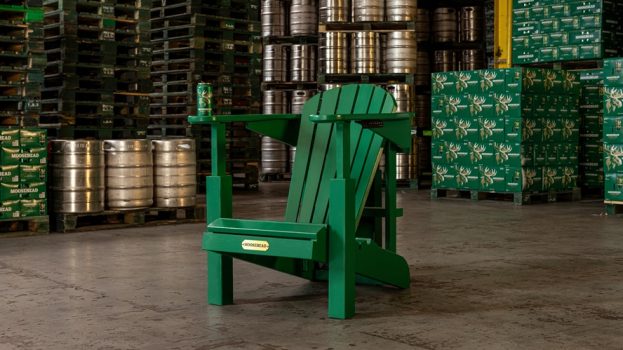As the country’s largest brewer, Labatt Canada doesn’t simply want to sell more suds.
Increasingly, the AB-InBev subsidiary wants to promote moderation and positive mental and physical health choices – or “smart drinking.” It’s a mandate that has grown in lockstep with increased demand from younger beer drinkers for low- and no-alcohol brews.
Between 2013 and 2018, sales of non-alcoholic beer grew more than 50%. Over the last year, the category has climbed 12% in total volume, according to the beer company. Mintel research suggests consumption is being driven by the “sober curious,” a group of mostly millennials who opt for alternatives to alcoholic drinks in search of more balanced and healthy lifestyles.
According to data cited by Labatt, 64% of no- and low-alcohol beer is consumed by those aged 19 to 34. Women most often choose non-alcoholic beer as an alternative to sugary drinks, while men view it as suitable for a variety of social occasions.
Labatt hopes to capitalize on the category’s growth with the launch of Budweiser Zero, a new offering containing 0.0% alcohol, zero sugar and only 50 calories – and the successor of Budweiser Prohibition Brew, introduced in 2016, which has been phased out globally. Bud Zero is being promoted with digital ads targeting existing non-alcoholic beer drinkers and a partnership with entertainment company Live Nation.
But Michelle Tham, Labatt’s head of education, also has a role to play in promoting the new offering as a viable alternative for suds fans. As a beer cicerone – an expert equivalent to a wine sommelier – her job involves growing the beer category as a whole, in part through educating consumers on the array of choices the category offers – including those once on the fringes.
You’re head of education at Labatt. What does that mean?
I joined the company in 2014 having achieved my certified cicerone, an accreditation with a professional level of knowledge related to brewing, brewing ingredients, beer styles, keeping and serving beer and pairing it with food.
At that point, there were very few in Canada and even fewer females. We now have over 150 cicerones in Canada, and about 20 of them work for us here at Labatt. We’re proud to have more cicerones than any other brewer in the country.
My role has a national scope, and is fairly cross-functional. I work quite closely with our brands, with our innovation department, as well as with category growth – which is our arm of category management – trade marketing, which is what makes my job really fun. Being a subject matter expert, I get to work on a bit of a consultative basis to serve the needs of many different functions within our business.
How has your role evolved as Labatt expands into new categories outside of traditional beer?
As we innovate into the ready-to-drink space and into low- and no-alcohol – including Bud Zero – it’s important that we always bring it back to the art of brewing and the role that ingredients play in developing the flavours our consumers enjoy.
My expertise will always be rooted in beer primarily – that’s what I’ve studied. But I came from the food and beverage and hospitality industry, so I have a familiarity with wine and spirits. I’m also pursuing my certifications in wine, spirits and saké concurrently right now to bolster the credibility I have in beer. As our portfolio grows, my knowledge needs to grow with it. So I’m going back to the books to expand my knowledge. My ability to understand the process gives me a little license to talk about our products, even if they’re not decidedly beer products.
At the end of the day, when we talk about our products in a way that they are meaningful to the consumer, helping them understand the options of their choice – what they see, smell, taste – learning about the tradition, or the history of what has driven the innovation of that product, how the ingredients contribute to what you’re smelling and tasting, and truly just painting a picture of what you’re about to experience, all come back to the basic skills of being a cicerone.
How do you help educate consumers through marketing, particularly at a time when travelling across the country is more difficult?
The communication of each product’s unique features and benefits need to come from a place of technical knowledge, in addition to the brand message. My role is integrated with our brand teams and agencies, to ensure the words and images we use to describe our products are accurate and evocative in educating the consumer of what they should expect to see, smell and taste from the experience.
And although travel has been a limitation, like many others, the messaging and education in my role is adapting to be shared over digital means. For example, our partnership with the live-streamed and on-demand consumer learning platform, HYR Live, allows me to bring the education and advocacy of our brands to the consumer at-home. Consumers are able to join me live to learn how to make Bud and BBQ classics, like Budweiser Zero-braised baked beans and bacon or homemade Budweiser BBQ sauce.
Labatt is encouraging consumers to ‘drink wiser’ and think about overall wellness. Are you involved in promoting healthy choices?
My focus is helping Canadians understand what’s in the bottle behind the label. A lot of that work is what we call helping Canadians ‘beer better.’ The more you know about beer, the more you understand how it’s best enjoyed, how to best serve it, how to find the right style for you. And part of ‘beering better’ is [learning how to] fit beer into your balanced lifestyle as your tastes and your behaviour continue to change.
Not only do we have a great opportunity with Budweiser Zero, which meets the needs of [those looking for] 50 calories, zero sugar and zero alcohol. It’s also giving me the opportunity to talk about all the choices that Canadians have when it comes to beer – that standard American lager isn’t the only choice out there, or for many millennials, the IPA isn’t the only choice out there.
There are opportunities to have lower alcohol beers that are lower in carbs and lower in calories that fit into that balanced lifestyle, like Michelob Ultra. You also have beers like Mill Street and its core lineup of Original Organic, 100th Meridian, Cobblestone Stout and Tank House Ale that are all organic. That’s a way of fitting into your lifestyle choices of having the options to choose things that are better for the world, and in essence also a little bit better for you.
And then we have RTD products that are zero sugar, like Nutrl, our vodka soda brand, that if you’re looking to avoid sugar or have an allergy or choose to avoid gluten, there are options for you there as well. There are many ways that Canadians can ‘beer better.’ And that opens up opportunities for me to educate them about it.
This interview has been edited for clarity and length.
























